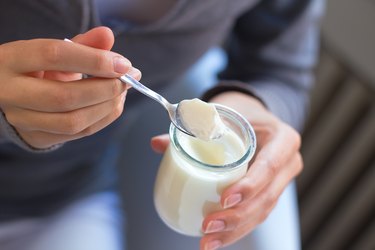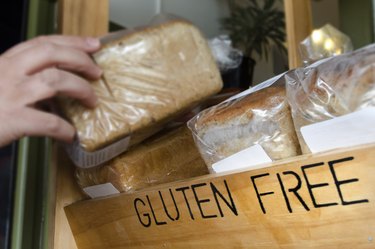
Air biscuit. Bottom burp. Toot. Butt trumpet. SBD. Whatever you call it, farting is part and parcel of being human.
After all, gas is a natural byproduct of digestion. When you eat a meal, the microorganisms in your large intestine (aka colon) help break down the fiber, sugars and starches in your food by fermenting them.
Video of the Day
Video of the Day
"While the bacteria feed on these substances, they create gaseous byproducts, including methane, hydrogen, carbon dioxide and sulfide," Ugo Iroku, MD, a gastroenterologist in New York City, tells LIVESTRONG.com. "These gases accumulate in our large intestine and then move downward through the bowels and rectum until they reach the anus. Once there, our internal sphincter opens to release the air."
So, passing gas is a part of life. But just how much farting is normal? Well, there's a spectrum.
"The average person farts between eight and 20 times a day, producing about 1½ to 2 liters of gas," Dr. Iroku says.
We all have our own fart set-point — meaning, on a daily basis you might let it rip more or less often than someone else. But if yours is far higher than the average or you notice a sudden uptick, it's worth exploring the cause.
Frequent Gas Is Typically a Good Sign
A plant-based diet chockfull of high-fiber foods — like legumes, whole grains, fruits and veggies — does a body good. According to the Harvard T.H. Chan School of Public Health, fiber reduces your risk of heart disease, diabetes and GI disorders. It also makes you toot.
Related Reading
Here's why: Most foods are processed into simple sugars by enzymes in the small intestine and then absorbed into the bloodstream through the intestinal lining. But fibrous foods are harder to digest. Your body can't absorb fiber, so it passes into your large intestine, where your gut bacteria live.
"These microorganisms like to eat fiber — and the more of it they feast on, the more gas they produce," Dr. Iroku says. "Luckily, the gas associated with a high-fiber diet typically doesn't smell foul."
While it's generally healthy to up your fiber intake (most people don't get enough), make the increase gradual in order to avoid excess flatulence.
"This gives your system time to get used to it," Dr. Iroku says. "As your body adjusts to greater quantities of fiber, the farting will lessen."
Tip
Women should get 25 grams of fiber daily, while men should aim for 38, according to the Academy of Nutrition and Dietetics.
Other Reasons You Might Be Cutting the Cheese a Lot
Farting more than usual could indicate that something is off in your system, particularly when it's associated with other symptoms like diarrhea, bloating or stomach pain.
"Call your doctor if you notice red flags like blood in the stool, weight loss or a significant change in bowel movements," Dr. Iroku says.
Related Reading
Here are some possible reasons why you're experiencing extra thunder down under.
1. You’re Lactose Intolerant

According to the National Institutes of Health (NIH), approximately 65 percent of people have trouble digesting lactose because they don't have enough of the enzyme lactase in their small intestines. As a result, dairy passes into your colon, where your gut bacteria ferment it, releasing gas along the way.
If you suspect lactose might be an issue for you, cut back on dairy for a couple of weeks and see if you notice an improvement. A February 2018 study in Critical Reviews in Food Science and Nutrition found that taking a probiotic can also help.
Related Reading
2. You’re Swallowing Too Much Air
We all naturally gulp a bit of oxygen while we chow down, but you might be taking in more than necessary — especially if you hoover your food.
"Eating quickly leads to air ingestion, called aerophagia," Dr. Iroku says. The fix? "Take your time while eating, and chew thoroughly."
Other causes of excess air intake include smoking, chewing gum, drinking carbonated beverages, using a straw and strenuous exercise that causes heavy breathing.
"The average person farts between eight and 20 times a day, producing about 1½ to 2 liters of gas."
Interestingly, stress and depression can also cause aerophagia. "People with anxiety may hyperventilate and unconsciously swallow more air," Dr. Iroku says.
Usually the air remains in the esophagus, where you burp it out. But some makes its way to the stomach, exiting the body when you break wind.
3. You Have a Surplus of Bacteria in Your Small Intestine
"Gut bacteria are predominantly located in your colon," Dr. Iroku says. "If they spread upward to your small intestine, you might have a condition called small intestine bacterial overgrowth, or SIBO."
Besides flatulence, other symptoms of SIBO include bloating, abdominal discomfort, diarrhea and constipation.
"Talk to your doctor if you suspect SIBO," Dr. Iroku says. "They may recommend you cut back on medications that encourage bacteria growth, like probiotics or acid suppressors." (A small June 2018 study in Clinical and Translational Gastroenterology found an association between probiotic use and SIBO.)
4. You’re Not Adequately Digesting Your Food

Certain health conditions, like celiac disease or pancreatic insufficiency (EPI), inhibit your body's ability to absorb nutrients.
"When people with celiac disease eat gluten, their body has an inflammatory response that damages part of the small intestine, making it difficult to process food," Dr. Iroku says. "And if you have EPI, your pancreas won't produce enough enzymes to digest your meal."
As a result, all that undigested food travels to the colon and your gut bacteria go to town.
So how do you know if celiac or EPI are to blame for your gassiness? "Common signs are flatus with a foul odor; greasy, pale stool that floats; and weight loss," Dr. Iroku says.
Another heads up: Celiac disease is genetic. Per the Celiac Disease Foundation, if someone in your immediate family has it, you've got a one in 10 chance of developing it too.
And according to the National Pancreas Foundation, people with chronic pancreatitis and cystic fibrosis are at greater risk for EPI. Make an appointment with your doc if you're showing signs of either of these issues.
5. You’re Eating Artificial Sweeteners
A July 2017 review in Advances in Nutrition suggests that sugar substitutes, including sorbitol and xylitol, can cause flatulence along with diarrhea and cramps.
Because these sweeteners are poorly absorbed by your small intestine, bacteria in the colon metabolize them, creating gas in the process. Give these substances the boot and see if your farts ease up.
6. You’re Constipated
According to Johns Hopkins Medicine, the longer poop stays in your colon, the more it will ferment — and the more gas it will let off.
"In addition, air can seep out around hardened feces," Dr. Iroku says. "If farting is caused by constipation, it will smell like poop."
To keep things moving, drink plenty of fluids, exercise and make fiber your friend.
7. You Have Irritable Bowel Syndrome (IBS)

If excess gas is accompanied by other forms of tummy trouble (bloating, abdominal discomfort, diarrhea, constipation), IBS might be the culprit. Per the Mayo Clinic, IBS is a chronic condition that affects the large intestine and can often be managed by changes to your diet and stress-management strategies. With this condition, your farts may even smell like rotten eggs.
"Your doctor might suggest a 'low FODMAP' diet, where you eliminate or reduce the main aggravates of gas," Dr. Iroku says.
FODMAPs are foods that are difficult for the small intestine to absorb. (You can find a full list here.) In a January 2017 article in Gastroenterology & Hepatology, 76 percent of people with IBS found that their symptoms, including flatulence, improved on a low-FODMAP diet. Meet with your physician or a registered dietician before implementing this eating plan.
Related Reading
What If You’re Farting Less Than Usual?
If you haven't made any dietary changes, chances are you're breaking wind in dreamland.
"Once the gas in your colon reaches a certain pressure point, your sphincter muscle releases to let it out," Dr. Iroku says. "If you're not farting during the day, it will come out when you are asleep and your body is relaxed."
Another reason you might not be popping fluffies? "You naturally pass gas when you are moving your bowels," Dr. Iroku says. Some of your daily fart quotient might be emerging when you're sitting on the toilet.
Although it's possible that a decline in tooting could be a side effect of a serious gut issue, in that case you'd also be in considerable discomfort.
"If you have appendicitis or diverticulitis, where your bowels become irritated, infected and inflamed, your intestines will stop moving and you won't fart," Dr. Iroku says. "But you probably won't even notice your lack of gas because you will be in such severe pain."
- Harvard University School of Public Health: "Fiber"
- NIH: "Lactose intolerance"
- Critical Reviews in Food Science and Nutrition: "The effects of probiotics in lactose intolerance: A systematic review"
- Clinical and Translational Gastroenterology: "Brain fogginess, gas and bloating: a link between SIBO, probiotics and metabolic acidosis"
- National Pancreas Foundation: "EXOCRINE PANCREATIC INSUFFICIENCY (EPI)"
- Celiac Disease Foundation: "What is Celiac Disease?"
- Advances in Nutrition: "A Systematic Review of the Effects of Polyols on Gastrointestinal Health and Irritable Bowel Syndrome"
- Johns Hopkins Medicine: "Bloating: Causes and Prevention Tips"
- Mayo Clinic: "Irritable Bowel Syndrome"
- Gastroenterology & Hepatology: "Controversies and Recent Developments of the Low-FODMAP Diet"
- Harvard Medical School: "Try a FODMAPs diet to manage irritable bowel syndrome"
- Academy of Nutrition and Dietetics: "Easy Ways to Boost Fiber in Your Daily Diet"
Is this an emergency? If you are experiencing serious medical symptoms, please see the National Library of Medicine’s list of signs you need emergency medical attention or call 911.